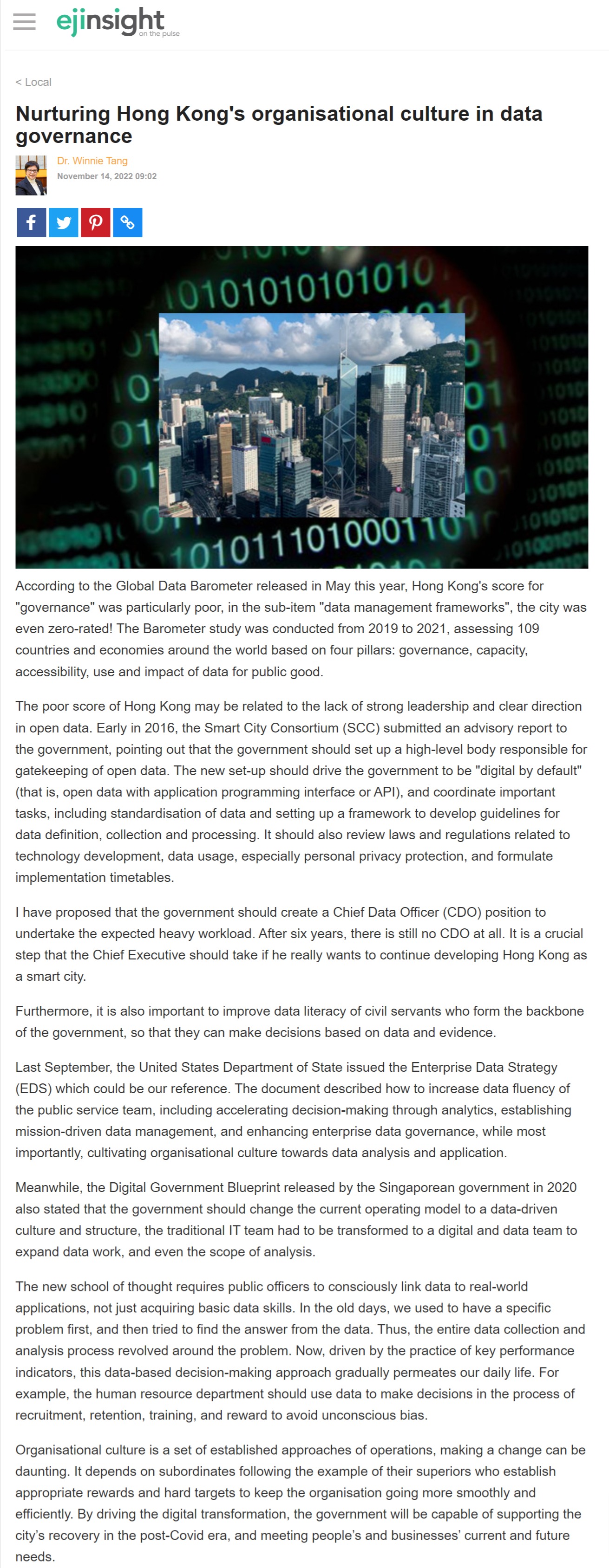網上版請按此

Nurturing Hong Kong's organisational culture in data governance
According to the Global Data Barometer released in May this year, Hong Kong's score for "governance" was particularly poor, in the sub-item "data management frameworks", the city was even zero-rated! The Barometer study was conducted from 2019 to 2021, assessing 109 countries and economies around the world based on four pillars: governance, capacity, accessibility, use and impact of data for public good.
The poor score of Hong Kong may be related to the lack of strong leadership and clear direction in open data. Early in 2016, the Smart City Consortium (SCC) submitted an advisory report to the government, pointing out that the government should set up a high-level body responsible for gatekeeping of open data. The new set-up should drive the government to be "digital by default" (that is, open data with application programming interface or API), and coordinate important tasks, including standardisation of data and setting up a framework to develop guidelines for data definition, collection and processing. It should also review laws and regulations related to technology development, data usage, especially personal privacy protection, and formulate implementation timetables.
I have proposed that the government should create a Chief Data Officer (CDO) position to undertake the expected heavy workload. After six years, there is still no CDO at all. It is a crucial step that the Chief Executive should take if he really wants to continue developing Hong Kong as a smart city.
Furthermore, it is also important to improve data literacy of civil servants who form the backbone of the government, so that they can make decisions based on data and evidence.
Last September, the United States Department of State issued the Enterprise Data Strategy (EDS) which could be our reference. The document described how to increase data fluency of the public service team, including accelerating decision-making through analytics, establishing mission-driven data management, and enhancing enterprise data governance, while most importantly, cultivating organisational culture towards data analysis and application.
Meanwhile, the Digital Government Blueprint released by the Singaporean government in 2020 also stated that the government should change the current operating model to a data-driven culture and structure, the traditional IT team had to be transformed to a digital and data team to expand data work, and even the scope of analysis.
The new school of thought requires public officers to consciously link data to real-world applications, not just acquiring basic data skills. In the old days, we used to have a specific problem first, and then tried to find the answer from the data. Thus, the entire data collection and analysis process revolved around the problem. Now, driven by the practice of key performance indicators, this data-based decision-making approach gradually permeates our daily life. For example, the human resource department should use data to make decisions in the process of recruitment, retention, training, and reward to avoid unconscious bias.
Organisational culture is a set of established approaches of operations, making a change can be daunting. It depends on subordinates following the example of their superiors who establish appropriate rewards and hard targets to keep the organisation going more smoothly and efficiently. By driving the digital transformation, the government will be capable of supporting the city's recovery in the post-Covid era, and meeting people's and businesses' current and future needs.
Dr. Winnie Tang
Adjunct Professor, Department of Computer Science, Faculty of Engineering; Department of Geography, Faculty of Social Sciences; and Faculty of Architecture, The University of Hong Kong